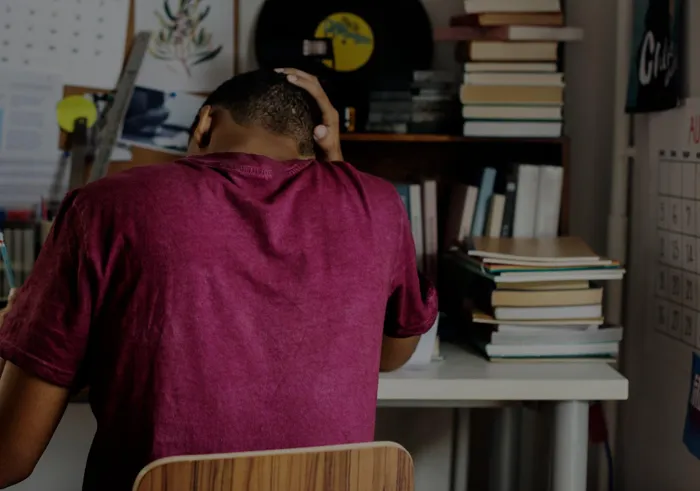'Emotional toll of being unemployed is relentless' | Youth Unemployment Crisis

Unemployed South African youth are battling depression and low self-esteem.
Image: Ron
In South Africa, where youth unemployment has reached alarming levels, a quiet crisis is unfolding, one not just of economics, but of identity, anxiety, and emotional survival.
For many young people, the struggle to find work is also a battle to stay hopeful.
Through the stories of Mia-Mae, a 20-year-old from Cape Town, and Okgethilwe, 23, and the expert insights of professionals from the South African Depression and Anxiety Group (SADAG), we take a look at what it means to be young, unemployed, and trying to hold on to a sense of self.
“If you’re broke, you’re broken.”
For Mia-Mae, the emotional toll of being unemployed is relentless.
“You’re left just trying to survive each month. That alone is exhausting,” she says.
“Money really does make the world go around, and without it, you’re left just trying to survive each month.”
She speaks openly about the fear that creeps in when hope runs low. “It gets to you,” she admits.
“You start thinking you’ll end up on the streets, never getting anywhere, never getting a job. You feel helpless.”
Mia-Mae doesn’t sugarcoat her hard days. “I don’t really cope. I just sleep and let the day pass,” she says.
“I tell myself I can’t do it, even if a small part of me hopes one day I might.”
She doesn’t compare herself to her peers, but the lack of support has not gone unnoticed.
“Many of them had more support, like parents who could help them through school, guide them, or pay for extra help.”
Her self-esteem has taken a serious hit. “I’ve let myself go,” she says. “I used to want to be better, but now, looking for a job feels hopeless. It’s like nothing will ever change.”
Living alone without a steady income has added layers of stress. “Nothing comes for free, and if you’re broke, you’re broken,” she says.
“It’s hard to stay motivated when it feels like nothing you do matters.”
Even when she tries, rejection can be crushing. “They feel dark and depressing,” she says of her days.
“I spend a lot of time just thinking of ways to make money, but even when I try, rejection hits hard. It makes things worse.”
She also feels the sting of judgment. “I feel like a disappointment, like I’m just surviving off other people’s money,” she shares.
Support from her mother and boyfriend provides moments of comfort. “They remind me that I’m worthy of good things and capable of greatness, even when I don’t believe it myself.”
Still, opening up is difficult. “Talking doesn’t always help,” she says. “People can’t fix how I feel.”

For unemployed youth rejection can be crushing which can lead to depression.
Image: Freepik
Though she has sought help in the past, it hasn’t brought relief. “None of it helped me, not even a little.”
She’s aware of organisations offering support, but says: “I just don’t think they can help either.”
So what keeps her going? Her answer is as raw as it is honest: “I’m forced to wake up every day. It’s not really a choice.”
And yet, even amid the darkness, a faint hope lingers.
“In the next year, I want to get a job, save up for a motorbike, and eventually move into my own apartment. A goal that gives me something, however distant, to reach for.”
“No one is coming to save me”
For Okgethilwe, unemployment has been a deeply emotional experience.
“It really knocked my confidence,” he says. “I stress that not having everything together now makes me look useless to my family and peers. Being unemployed has caused me to belittle myself and become anxious about my own future.”
He’s battled stress and depression, especially in his pursuit of independence. “I’ve often felt like I’m not doing enough, even when I have more support than some of them,” he admits.
Social media and streaming platforms proved to be more of a hindrance than an escape. “I had to shift my focus back to real progress,” he says. “I had to step back.”
Even when comparisons eat at his confidence, he’s found strength in self-reflection.
“I’ve learned what it takes to be part of a team and to keep pushing myself,” he says. “Being unemployed actually made me more confident in what I can do.”
One of his greatest frustrations is the job search itself. “You can apply to 50 jobs in a day and still hear nothing. There’s no guidance, no feedback, nothing to help us improve,” he explains.
On top of that, many are simply excluded from opportunity. “Not everyone has access to resources like data or job platforms, which is a major barrier for many.”
Still, he stays focused. “I’m working hard to become a chef. I do my assignments, practice my skills, and focus on improving myself every day.”

Constantly being rejected can take toll on young people.
Image: rawpixel.com / Freepik
Judgment from others stings. “I felt that others have misunderstood that even though you are staying with or being supported by family, it does not mean that I have decided to waste my time and slack around.”
Fortunately, he has a strong support system. “Because we all believe that the truth is part reality and no matter how painful it is, my mom does not hesitate to hold me accountable for my actions, emotions, character, happiness and peace,” he says.
Though he hasn’t spoken to a therapist, conversations with loved ones have helped.
“I used to think asking for help meant I didn’t know what I wanted, but I’ve learned I can still grow with support from the people around me.”
His mantra now is a declaration of self-responsibility: “Knowing no one is coming to save me.”
Looking forward, he sees possibility. “With access to technology, online income streams, and business resources, I see more potential now than ever before.”
His goals are clear: “Continue my studies, grow as a chef, and keep working on my mental well-being. I want to be better than I was yesterday, both in the kitchen and in life.”
A national issue
Mental health professionals at SADAG are seeing the same patterns, stress, burnout, and depression play out across the country.
Roshni Parbhoo-Seetha, Education Project Manager at SADAG, says the emotional cost of youth unemployment is immense.
“Many young people describe feeling hopeless, overwhelmed, and stuck,” she says. “It can lead to burnout, anxiety, and even depression.”
And then there’s the shame. “There’s this sense of failure. And when that’s paired with poverty or no support, it can even lead to suicidal thoughts.”
Registered counsellor Vanishaa Gordhan Narotam agrees.
“There’s often a sense of constant worry about the future, which fuels anxiety. And deep feelings of sadness or hopelessness that can spiral into depression,” she says.
She adds that the loss of identity is one of the most damaging effects. “They internalise the idea that they’re ‘not good enough’ or ‘failing at life.’”
Not all young people have access to emotional support, and that can make all the difference.
“Someone from a stable home might have some financial cushion or emotional backing. For others, especially from low-income households, unemployment becomes a family burden.”
But even without money, encouragement helps. “Being emotionally present can make a world of difference,” Vanishaa says.
SADAG encourages young people to reach out.
“Whether it’s through our helplines, a local counsellor, or someone they trust, talking helps,” says Parbhoo-Seetha.
She also urges young people to find value beyond employment.
“Your value isn’t defined by employment. Skills programmes, volunteering, or joining support groups can bring back structure and connection.”
Holding on
For Mia-Mae and Okgethilwe, as for many others, the struggle isn’t just to find work, it’s to hold on to themselves in the process.
The emotional toll of unemployment is profound, but it’s too often overlooked.
We must stop measuring worth by productivity, and instead start listening, truly listening, to the experiences of those living through it.
Because beneath the silence of unread job applications and quiet days at home are voices that still dream, still hope, and still fight to be heard.
IOL Lifestyle
Related Topics: